Nutritional Requirements for Parakeets: A Comprehensive Guide
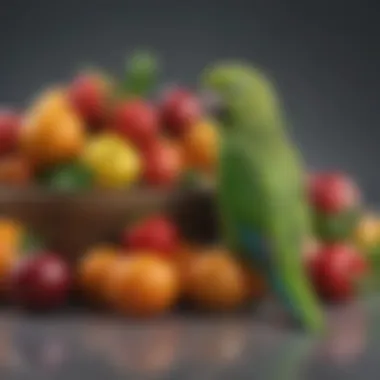
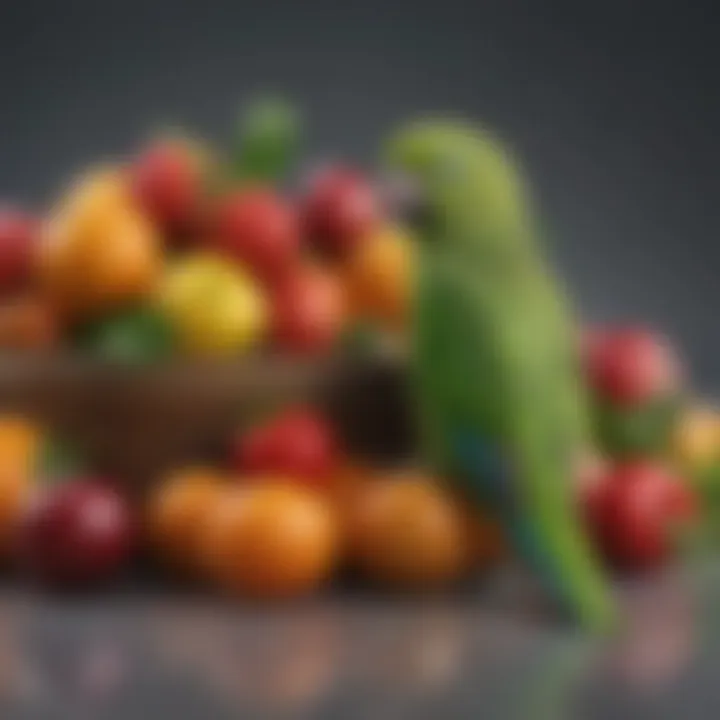
Intro
Understanding the nutritional needs of parakeets is essential for any pet owner aiming to promote the wellbeing of their feathered companions. Parakeets, widely known for their vibrant colors and playful personalities, require a balanced diet tailored to their specific species. This dietary approach not only enhances their health but also contributes significantly to their happiness and longevity in a home environment.
This article offers a detailed examination of essential dietary elements, identifying both safe and harmful foods, and exploring various feeding strategies. As we dissect these topics, remember that a well-rounded diet is integral to fostering an enjoyable and healthy existence for your parakeet. Let's begin with practical care tips that enhance not only nutritional success but overall bird wellbeing.
Care Tips
Successfully providing care for parakeets involves attention to their diet, habitat, and daily routines. When well maintained, these elements coherently contribute to the bird’s health and happiness. Owners must stay informed and responsive to the needs of their parakeets through structured care regimens.
Daily Care Routines
Maintaining a consistent daily routine for feeding, social interaction, and cleanliness is crucial. Parakeets should be fed fresh fruits and vegetables alongside a high-quality seed mix. Neglecting these aspects can lead to nutritional deficiencies. Consistency also fostering trust, reducing stress for the bird.
Cage Setup and Maintenance
Creating an appropriate cage environment requires careful consideration. The cage should be large enough for flying and equipped with perches of varying sizes and textures to assist in foot health. Regular cleaning of the cage space ensures a hygienic space that promotes the overall health of your parakeet.
Hygiene and Cleaning Practices
Routinely cleaning food and water dishes, removing waste, and cleaning surfaces in the cage must be part of maintenance strategies. Establish a schedule, perhaps weekly or bi-weekly, that means these tasks are managed efficiently. Cleanliness reduces the risk of disease and supports strong immune systems in parakeets.
Seasonal Care Adjustments
Changing seasons can affect the needs of parakeets, hindering specific requirements during heat or cold periods. Monitor the temperature, drafts, and humidity levels in the environment. Protect the bird from drastic environmental changes since these can induce stress and health concerns.
"Understanding the environment is as important as diet for a parakeet's happiness."
By implementing these care tips, parakeet owners can establish the foundation to effectively cater to the nutritional and emotional needs of their pets. Next, we will delve into behavioral insights on how parakeets communicate and express their needs.
Understanding Parakeet Nutrition
Understanding parakeet nutrition is essential for every pet bird owner. These birds are lively and intelligent, displaying a variety of behaviors and needs. Their diet plays a crucial role in their overall health, affective behavior, and longevity. Adequate nutrition ensures that parakeets remain energetic and active, preventing several health issues that might arise from poor dietary habits.
Economic considerations also arise in feeding parakeets. The right diet can minimize vet visits by preventing nutritional deficiencies and related disorders. As knowledge of avian nutrition increases, the resources available for feeding parakeets become often misinformed. Therefore, thorough understanding is necessary.
Basic Nutritional Needs
Parakeets require a balanced diet rich in several key nutrients. They need proteins, carbohydrates, fats, vitamins, and minerals. Each component contributes to a healthy metabolism and cellular functions. Proteins are essential for growth, reproduction, and maintenance of body tissues. Parakeets can obtain protein from sources such as legumes, seeds, and specially formulated pellets designed for their species.
Carbohydrates provide energy on a daily basis. Foods high in carbohydrates include grains and fruits, both of which are beneficial. Parakeets typically love fruits, making it an excellent treat in moderation. It’s important to note that while seeds are loved by parakeets, they should make up only a portion of their diet to avoid obesity and related diseases.
Fats, while often scrutinized, are necessary in small amounts. Unsaturated fats from sources like nuts contribute positively to overall health. Vitamins and minerals also deserve attention. They aid in functions like immunity and bone development. A well-rounded diet containing these essentials helps parakeets thrive.
Importance of Dietary Balance
Maintaining a proper dietary balance is crucial. A well-blended diet helps ensure that parakeets do not develop malnutrition or vitamin deficiencies. Each nutrient aids particular bodily functions, working together for optimal health.
For example, a diet comprising primarily of seeds can lead to an improper mix of key vitamins. Often, seed diets are deficient in essential amino acids, calcium, and vitamins D and A. Making the diet varied is important, incorporating everything from seeds to veggies and pellets.
Furthermore, this diverse dietary regimen promotes natural foraging behavior, critical for parakeet happiness. Pet owners who pay attention to the nutritional needs and make balanced choices can significantly enhance their birds' quality of life. Regularly rotating fresh produce and supplements can ensure that dietary balance is maintained over time.
Types of Foods for Parakeets
Understanding the various types of foods for parakeets is crucial for their health and longevity. Each type offers unique benefits and considerations that can profoundly influence a parakeet's overall well-being. Providing a varied diet ensures that the birds receive essential nutrients required for their specific biology and lifestyle. Moreover, a nutritious diet can help to prevent link diseases and improve their quality of life over time.
Seeds
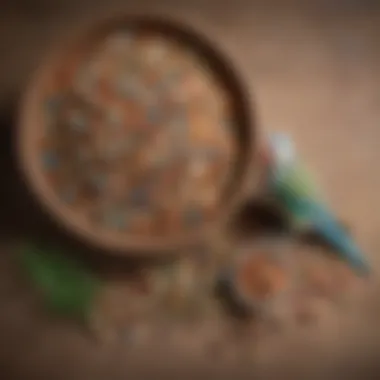
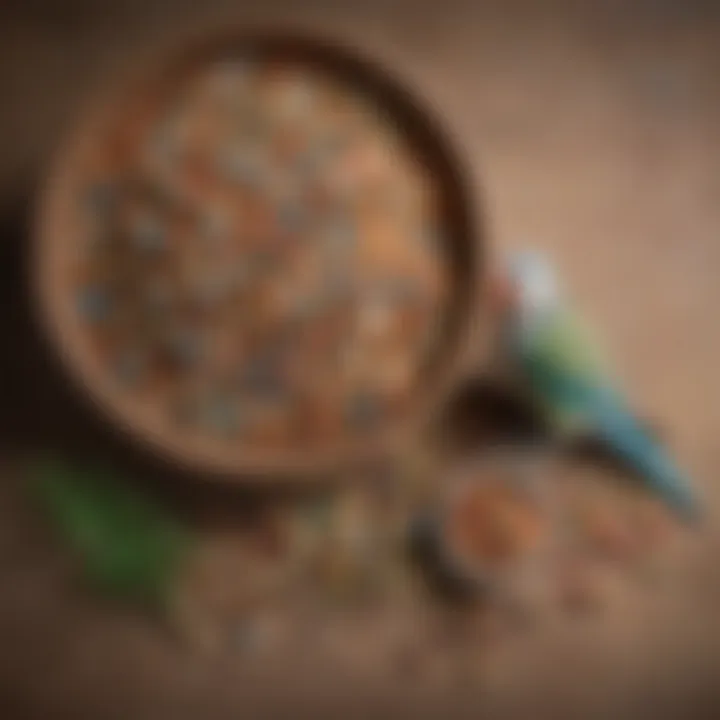
Seeds are often the first thing that comes to mind when considering parakeet nutrition. They are a primary dietary component, providing basic calories and essential fatty acids. However, not all seeds are created equal. Common choices include millet, canary seed, and sunflower seeds. While sunflower seeds are nutritious, they are high in fat and should only make up a small fraction of the overall diet.
It's important to offer seeds in moderation. A diet primarily based on seeds may lead to nutritional deficiencies, such as a lack of vitamins and minerals. Therefore, seeds should form only part of the diet, which encourages a more balanced intake.
The quality of seeds is also noteworthy. Choosing fresh, organic seeds can improve the value they bring to the parakeet’s diet.
Pellets
Pellets are developed to meet the nutritional needs of birds in a balanced and convenient form. Unlike seeds, pellets are formulated specifically with vitamins, minerals, and the right ratio of carbs and proteins. Brands like Kaytee and Zupreme produce quality pellets that are well-regarded by avian experts.
One advantage of pellets is that they minimize selective feeding. Parakeets have a tendency to pick and choose their favorite seeds while ignoring others. Feeding pellets can alleviate this issue much more effectively than seeds alone.
Nevertheless, an adjustment period may be necessary. If your parakeet is used to seeds, introducing pellets requires patience and even creativity. Offering flavored varieties or mixing them with seeds can promote acceptance hard-to-eat for your bird during this transition.
Fresh Fruits and Vegetables
A major aspect of a parakeet's diet should include an assortment of fresh fruits and vegetables. These foods add variety and provide essential vitamins and minerals. Important fruits include apples, berries, and bananas, while veggies can include carrots, broccoli, and leafy greens.
When introducing fruits and vegetables, remember to wash them thoroughly and chop them into manageable pieces. These fresh options not only supply vital nutrients but also enrich the diet with hydration. Birds often enjoy playfully interacting with fresh foods, stimulating natural foraging behaviors.
It's vital to avoid certain fruits and vegetables that are known to be toxic to birds. Avocado and onion are prime examples of harmful produce. Therefore, homeowners must act cautiously to ensure only safe items are provided.
Grains and Legumes
Grains and legumes are also beneficial food options for parakeets, often providing proteins and complex carbohydrates. Brown rice, quinoa, and lentils can enhance your bird’s diet. Just as with other foods, always prepare these items properly. Cooked grains and legumes should be devoid of salt or spices.
The inclusion of these items will improve dietary diversity, allowing delicate get more fats and energy from various sources. Moreover, legumes are rich in protein, essential for muscle development and replenishing energy.
Integrating a variety of foods from these four major categories creates a framework for a balanced diet. Striving for this balance not only supports adequate nutrition but also engages the parakeet mentally through enriched feeding experiences.
A well-rounded diet incorporates seeds, pellets, fresh produce, grains, and legumes, balancing nutrition while catering to taste preferences.
Feeding Methods
Feeding methods play a crucial role in the overall health and well-being of parakeets. Selecting the appropriate method not only affects the consumption habits of these birds but also influences their nutritional status. A well-structured feeding approach teaches parakeets about meal schedules and encourages healthier choices. Understanding the options helps bird owners make informed decisions tailored to their pets' specific needs.
Free Feeding versus Scheduled Feeding
Free feeding allows parakeets to access food at all times. This method mimics their natural foraging behavior. It can be beneficial for some parakeets that need to eat more often, like younger or very active birds. However, it has downsides. Some birds may overeat, leading to weight management issues and related health problems. Evaluating the individual needs of a parakeet is necessary before adopting this approach.
Scheduled feeding involves providing food at specific times throughout the day. This method often leads to portion control, ensuring that parakeets consume the necessary nutrients without excess. Scheduled feeding can establish routine, suggesting more security to the bird. Owners may notice clearer signs of appetite and health because the amount of food consumed is observable. However, it’s essential to observe the bird to ensure they adapt well to this method.
Using Food Dispensers
Food dispensers offer an innovative solution to manage feeding. These devices allow controlled portions and reduce excess food spillage that often leads to waste. They can enhance cleanliness around the cage. Depending on the design, they can also make it fun for the bird to engage with its food. A crucial point is to ensure dispensers are easy to access and clean.
Different types of food dispensers exist. Gravity feeders rely on the weight to release food gradually. Once installed, they require minimal ongoing input. On the other hand, other models imitate natural foraging by having moving parts, stimulating mental engagement. Though adaptable, such devices can be less flexible regarding each bird's individual dietary needs. Therefore, assessment and possibly frequent adjustment may be required if environmental changes impact the parakeet's diet or health.
In both scheduled feeding and the use of food dispensers, understanding the specific dietary requirements of a parakeet lays the groundwork for healthy feeding practices. Careful observation and adjustments will lead to better feeding experiences and support optimal nutrition.
Key Takeaway: Whether opting for free feeding, scheduled feeding, or food dispensers, the key lies in knowing the specific preferences and needs of each bird.
Foods to Avoid
Understanding what foods should not be included in a parakeet's diet is as crucial as knowing what is beneficial. Parakeets, like any other species, have specific dietary restrictions. This knowledge helps owners make informed choices, ensuring the health and well-being of their birds. Not only can inappropriate foods lead to serious health issues, but they can also affect the overall long-term vitality of the animal. Thus, avoiding harmful foods forms a cornerstone of responsible parakeet care.
Toxic Foods
Certain foods are outright toxic to parakeets. Awareness of these foods helps in preventing fatal mishaps. Some common toxic substances include:
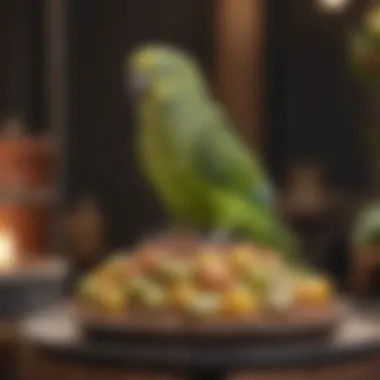
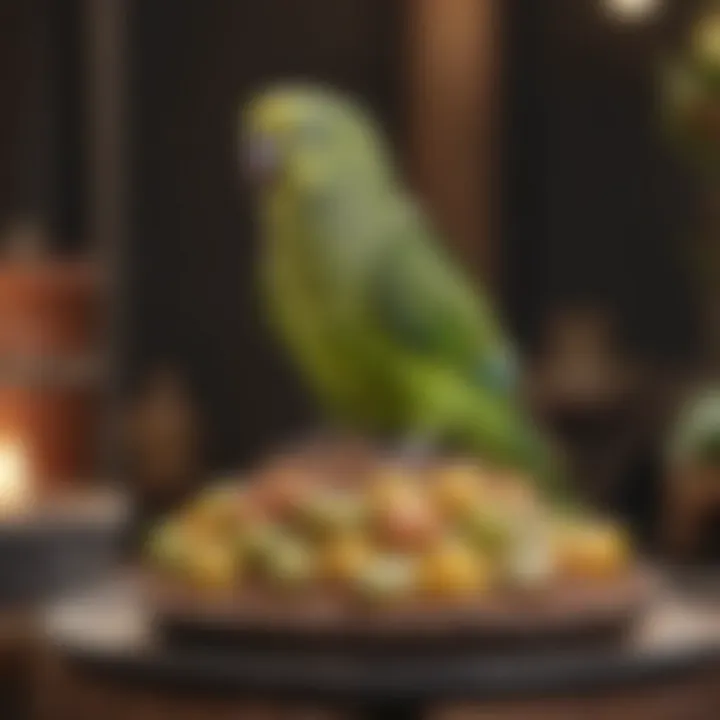
- Avocado: The flesh contains a substance called persin, which can be fatal.
- Chocolate: Even small amounts can lead to serious consequences due to theobromine.
- Caffeine: This can disturb a parakeet's heart and respiratory system.
- Onions and garlic: Both can damage red blood cells in birds.
- Tomatoes: Unripe tomatoes and stems are highly toxic for them.
One important thing to always consider is ensuring that food prepared for humans is free of these ingredients before offering them to birds. Also, even small amounts can create a toxic build-up over time.
High-Fat and Salt Foods
Parakeets have high energy needs, but those needs must be met with appropriate diets. Foods high in fat and salt can very quickly lead to overnutrition and other related issues, such as obesity. Here are some foods that should be avoided due to their high-fat and salt content:
- Chips and snacks: These items usually contain large amounts of salt and preservatives.
- Processed meats: The sodium content is often elevated, making it harmful.
- Certain seeds: While seeds are often included in a parakeet diet, some can be excessively high in fat. Sunflower seeds, for instance, if not balanced out, might contribute to an unwholesome diet.
Consuming high-fat and salt foods can result in severe health problems, including fatty liver disease and hypertension in parakeets. Maintaining a balanced diet is essential for optimal health, and this does mean making conscious efforts to avoid feeding your parakeet inappropriate foods.
Not every item labeled safe for humans is suitable for birds. Careful consideration is required to maintain parakeet well-being.
Supplements and Treats
The realm of supplements and treats serves as a crucial part of a nuanced approach to parakeet nutrition. While necessary dietary components from seeds, pellets, and fresh foods play vital roles in a bird's health, it is the addition of supplements and thoughtfully chosen treats that truly rounds out their nutritional profile. Ensuring your parakeet receives the right vitamins, minerals, and delightful moments that encourages natural behaviors can lead to an improved quality of life.
Importance of Vitamins and Minerals
In the wild, birds consume a diverse array of foods rich in essential nutrients. These and others are difficult to replicate in typical captive diets. Thus, integrating supplements is often necessary to prevent deficiencies. Key vitamins such as A, D, E, and K, as well as essential minerals like calcium and phosphorus, play significant roles in maintaining bodily functions. For example:
- Vitamin A: Crucial for clear vision and healthy skin.
- Vitamin D: Needed for calcium absorption, which supports bone health.
- Calcium: Vital for egg-laying females and overall skeletal structure.
- Vitamin E: Important for immune system function.
Regular monitoring and sometimes, incorporating products like Nutri-Berries or Tropican High Performance Granules can supplement any deficits in a parakeet's primary diet. It is advisable to consult a veterinarian to determine the specific needs of your bird along the lines of ear, skin, or breathable needs concerning vitamins and minerals.
Natural Treats for Enrichment
Natural treats hold importance beyond just nutrition; they contribute to a parakeet's mental well-being. When we speak of natural treats, we invoke items such as freshly sourced fruits, vegetables, and even some nuts in moderate amounts. The process of foraging offers mental stimulation which is essential for such intelligent birds. Some ideal treats include:
- Fruits: Apples, pears, grapes, and berries.
- Vegetables: Carrots, leafy greens like kale, and bell peppers.
- Nuts: A small offering of almond or walnut, unsalted.
By presenting these treats thoughtfully, we engage the parakeet's natural instincts. Items should be provided in controlled portions to ensure that they do not dominate the main nutrition from a balanced diet. It also helps to chop or cube fruits and veg, encouraging pecking and play, leading to a happier, active behavior observed in the bird.
Feeding Frequency and Portions
Feeding frequency and portion sizes for parakeets are vital factors that influence their overall health and happiness. Proper feeding practice ensures that parrots receive the right nutrients in adequate amounts while supporting physiological needs. By understanding how often and how much to feed, parakeet owners enhance their bird's wellbeing significantly. Inadequate or excessive feeding could lead to obesity, malnutrition, or other health issues. Therefore, it's imperative to approach feeding with thoughtfulness and care.
Daily Feeding Guidelines
Daily feeding guidelines highlight the essential amount and frequency of food for parakeets. Typically, these birds should be fed once or twice a day. A schedule ensures that your parakeet processes food effectively, assisting in digestion and metabolism. The typical diet consists of seeds, pellets, fresh fruits, and vegetables, offering a range of vitamins and minerals essential for parakeet health.
A good rule of thumb is to provide a sufficiently filled bowl of food, being careful not to overfill and create waste. Watch for signs that your parakeet eats well, such as regular dropping production and a healthy weight. Each feeding should consist of about one to two tablespoons of high-quality seed or pellet mixture.
“Consistency is the stable foundation of parakeet feeding practices. Regular schedules lead to better eating habits.”
When introducing fresh fruits and vegetables, ensure they are offered in small portions once or twice a week capitalizing on their freshness and decreasing spoilage risk. Observing your pet’s behavior helps identify if they consume the available food completely. Adjustments may be necessary if it appears there's remaining uneaten food after each feeding session.
Adjusting Portions Based on Activity Level
Adjusting feeding portions according to activity levels ensures parakeets receive the right amount of food to maintain optimal health. Active parakeets tend to burn more energy, necessitating a slightly larger food quantity. Conversely, less active birds might require smaller portions to prevent overweight issues.
Monitor your parakeet's activity within its environment. Consider how much time it spends flying, playing with toys, or communicating with other birds. A bird that engages frequently in play or exercise generally requires more food than one that remains perched for most of the day.
Common indications of adequate feeding include regular preening and active social behavior—both signs of a healthy parakeet. Adjust portion sizes gradually based on consistent observation rather than making sudden large changes that may affect digestion and comfort.
Diet modifications may also vary due to season changes where a more diverse and Vitamin-rich intake occurs. Be mindful of observing behaviors while modulating portions for activity levels, ensuring each parakeet thrives within its unique Dietary requirements.
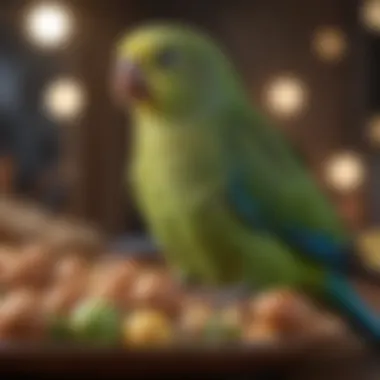
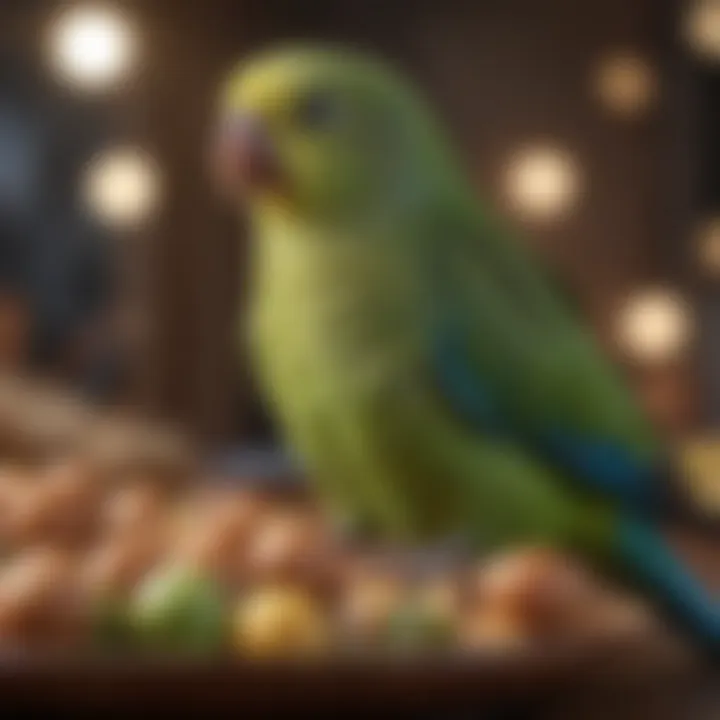
Monitoring Nutrition and Health
Monitoring nutrition and health stands as a crucial component in the care of parakeets, serving not only to address their immediate dietary needs but also to ensure their overall well-being. Observing the interplay between nutrition and health can reveal vital insights into the life of your pet bird. Key aspects include identifying signs indicating poor nutrition and the importance of regular health checkups.
Signs of Poor Nutrition
Identifying signs of poor nutrition can help prevent serious health issues. Symptoms may not always be obvious but knowing what to look for enhances rapid intervention. Common indicators include:
- Feather health: Dull or broken feathers may suggest inadequate nutrition. A bird's plumage quality reflects their health.
- Body weight: Sudden weight changes, whether gain or loss, can indicate dietary imbalances. Weigh your parakeet regularly to monitor changes.
- Behavioral shifts: Unusual fatigue or lethargy can signify that the bird is not getting the right nutrients.
- Droppings consistency: Monitoring droppings can tell you about the bird’s diet. Hard, runny, or discolored droppings might point to poor dietary choices.
Correct identification of these signs will likely lead you to adjust the parakeet's diet. Offering a balance of seeds, pellets, fruits, and vegetables is one way to enhance their nutrition consistently. Moreover, keeping a close eye on any medical signs should prompt immediate evaluation from a veterinarian.
Regular Health Checkups
Regular health checkups are essential for fostering optimal dietary and overall health in parakeets. Such evaluations help detect any underlying health issues early, thus assuring timely treatment. Doing so not only buffers against health deteriorations but also enhances the quality of life for your bird. Key benefits of regular checkups include:
- Preventive care: Emergencies can often be averted through preventative measures taken during checkups.
- Vaccinations and treatments: Vets will offer necessary vaccinations applicable to parakeets, also providing crucial information about any necessary treatments.
- Expert advice: Professional guidance on nutrition modifications tailored to your parakeet's specific needs can further enhance dietary management.
Frequent evaluations by a qualified avian veterinarian cultivate an environment that promotes better dietary practices and awareness. Ideally, consultations should happen at least once a year. Careful monitoring, appropriate adjustments, and regular health checkups together contribute positively towards ensuring that your parakeet leads a happier and healthier life.
Proper monitoring of both nutrition and health significantly impacts the lifespan and quality of life for parakeets. Investing time and effort into these areas rewards bird owners with a robust, lively companion.
Seasonal Dietary Considerations
Understanding seasonal dietary considerations is vital for anyone invested in the care of parakeets. Just as human diets can vary based on climate and accessibility of certain foods, the same applies to these birds. Their nutritional needs can shift with the seasons due to factors like temperature, humidity, and availability of fresh produce. Tailoring their diet not if only enhances their well-being, but it aslo promotes optimal health throughout the year. When the temperature rises or falls, parakeets react to these changes, affecting their behavior and, subsequently, their dietary requirements.
Adapting Diets to Seasonal Changes
In the warmer months, fresh fruits and vegetables can greatly enhance diets. Foods like apples, carrots, and leafy greens should be more accessible. These provide hydration and nutrients that support activity levels during these times. Higher humidity levels often mean birds require more water-rich foods to stay hydrated.
As temperatures drop in the winter, adding more calories is cruc!ial for maintaining energy levels. at this stage, seeds become more relevant, along with high-energy pellets, which can assist in achieving sufficient warmth. The bird’s metabolism may slow, and ensuring they intake adequate energy is necessary to prevent potential health issues and unexpected weight loss.
General Considerations:
- Temperature Influence: Warmth can stimulate feeding habits and nutritional needs.
- Freshness and Variety: Reassess food availability for various local products as seasons transition.
- Hydration Needs: Additionally focus on the availability of hydrating food during hot spells.
- Metabolic Requirements: Be aware of increased calorie standards in colder months to sustain energy.
Monitoring bird reactions to changes enhances educational practices on adapting to seasonal needs. Regular checkpoints on favorites and new food attempts evolve not if only their dietary understanding but aslo provides insights into personal consumption preferences.
Adjusting suffient diet isn't just about quantity but also the quality of nutrients and how avialable they are during seasonal shifts. Effective monitoring will help maintain a balanced nutritional regime, crucial for any long-term care ambitions.
Summary of Best Practices
Key Takeaways for Optimal Parakeet Care
In discussion of best practices for parakeet care, it is vital to recognize how significantly diet impacts a bird’s overall health and happiness. Understanding these practices helps owners provide a well-rounded nutritional regime. This ensures that these colorful birds flourish and remain active.
A balanced diet for parakeets should include a variety of seeds, pellets, fresh fruits, and vegetables. Different species can have varying needs, so researching specific breeds ensures a better diet plan.
One of the key points in optimal parakeet resource monitoring is being attentive to portion control. Overfeeding can quicken health issues like obesity, while underfeeding may lead to malnutrition. Adjusting portions depending on the bird's activity level ensures that energy requirements are met without oversupplying calories.
Owners should also avoid potentially toxic foods such as chocolate, caffeine, and avocados. Kepe in mind that a safe and inviting environment encourages healthy eating habits.
Regular health check-ups with an avian vet play an integral role. These visits help monitor Vitamin levels and overall health status. If deficiencies of crucial vitamins or minerals arise, timely supplementation may be necessary. Foods that can serve as natural treats not only offer enrichment but also promote behavioral health.
To summarize the best feeding practices for parakeets:
- Diversify diet. Include seeds, pellets, fruits, and vegetables.
- Monitor portion sizes. Adjust according to the bird's needs.
- Avoid toxic foods. Familiarize yourself with safe and harmful options.
- Provide supplements as needed. Ensure vitamins and minerals are up to par.
- Conduct regular health examinations. Partner with professionals for ongoing assessments.
Ensuring a nuance-rich dietary approach allows for the prevention of health challenges down the line.
This yields not only longevity but enhanced quality of life for parakeets.
"A properly managed diet can be key in unlocking a parakeet's natural possibility for prosperity and wellbeing."
Balancing an informed menu and attentive caretaking goes hand in hand. By implementing these best practices, owners contribute vastly to the nutritional health of parakeets.















